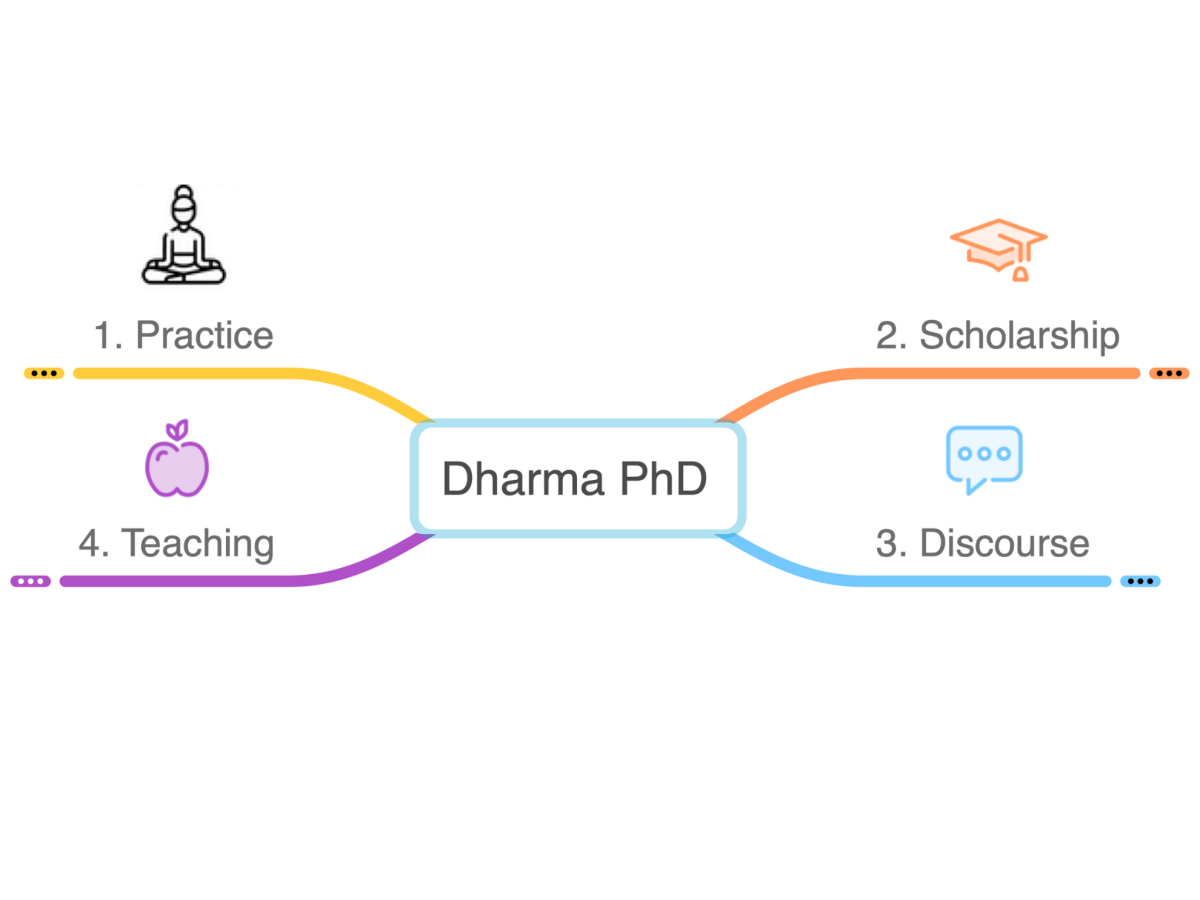Chatting with a friend about Existentialism, Buddhist Ethics, Determinism, Free Will (because that’s the kind of nerds we are). Today’s position on determinism / free will: I come from a strongly evolutionary perspective, and a strongly materialist perspective. Should be logically hemmed into determinism. I also study ethics and attempt to cultivate (aka, re-wire my […]
Tag: Learning in Public
Perhaps. Regarding Viññāṇa, I first heard the phrasing “Consciousness Of” from John Peacock’s “Buddhism Before the Theravada” series (Part 5, 53:45): “…consciousness is always a consciousness of…” something. That is, Gotama spoke of consciousness always having an object. (MN 38) “Consciousness is reckoned according to the very same condition dependent upon which it arises. Consciousness that […]
Playful Dhamma
Dear Friendlies, Greetings! Writing in a rush, my fingers tangling in the keyboard. Please excuse if incoherent; excited. I think I’ve understood something (again), and wondering if any of you have advice in this direction. An aspect of my life that is lacking in cultivation is the eleventh parami. Humor. Levity. Actually I think the best […]
Transcript for Episode 9 of Dharma PhD (the podcast); we talk about bringing a dhammic lens to the zombie apocalypse (ie, HBO’s TV Series, _The Last of Us_).
Perspective, Acceptance, Forgiveness, Gratitude. Thanks, science.
MN 139, Part 5: Subhūti
Maybe it’s not really about Subhūti?
Continuing to unpack MN 139, On Avoiding Conflict (Parts 1, 2, 3)… recently Ajahn Nisabho gave a bonzer talk, Culture War Pacifism: The Dhamma of Dolly Parton. He spoke about engaging skillfully in political discourse, about not being caught up in the collective papañca of the culture wars. Might this bit in MN 139, about […]
MN 139, on avoiding conflict, could be divided into three themes: cultivating oneself, communicating with others, and seeking out good influences in one’s life. I didn’t catch this at first, but now I see in this second theme, Communicating With Others, Gotama encouraging us to speak in such a way that we allow our interlocutors […]
Greeting, Friendlies! Part of the tangle of ideas I spoke about in Part 1 comes from reading or hearing teachers or practitioners* use words in contexts such that I think they are referring to a territory near(ish) to Awakening. In this post I’d like to acknowledge these words and ask the hivemind what others might […]
MN 139, Part 2: Synopsis
Cultivating oneself, communicating with others, and seeking out good influences. All this in the service of avoiding conflict. Sounds reasonable.
MN 139, Part 1: How to Not-Conflict
Playing around with different translations for the sutta title. Parsing Pāli for fun and profit…
I’ve been thinking a lot about Awakening. What is it? How does one get there? What does one “get” from it? Why do I want whatever it is? Are these even the right kinds of questions to be asking?
There is nothing here that has not been explained beforeAnd I have no skill in the art of rhetoric;Therefore, lacking any intention to benefit others,I write this in order to acquaint it to my mind. ~Shantideva, A Guide to the Boddhisatva’s Way of Life, Translated by Stephen Batchelor
Sometimes ideas get all wrapped up and around and through each other and a clever theory, when gently prodded, reveals itself a writhing, gnarly mess. Maybe this doesn’t happen to you? It totally happens to me. I think I understand a thing, I get all excited about it, I try explaining it to someone, or […]
Edit: If you want to start with Part 1, that’s here. The meditation teacher Leigh Brasington wrote a book on Dependent Origination which he self published and made available for Dāna on his website. He kindly (and enthusiastically!) read my previous post on DO and Conditionality. With his permission, here’s an image we cobbled together: A few […]
After I left military service in 2014, I moved to Paris and studied Philosophy for two years. The most important course I took during that time was “Modern Critical Theory” where a long-limbed, curly-cue of a Frenchman introduced me to Postmodernism and Critical Theory. In that course I read Western thinkers touching into the same concepts […]
In Part 1 we talked about motivation for starting an Independent PhD. But why an Independent PhD rather than a classic, Institutional PhD? I describe my Independent PhD as “Four-ish years of study, practice, and discourse that culminates in a book no-one will read.” But the beauty of an Independent PhD is that it doesn’t have to be four […]
Part 1 – Are there two Nibbānas?
On Anurodha, “Liking”
In your day-to-day, off-the-cushion experience, what part of the 12-link Dependent Origination cycle (12-nidanas) do you notice most readily? I ask because I think it may be the case that many of us spend our days “liking” stuff or “disliking” stuff. But liking/disliking is not in the 12-nidanas. When I first began learning about Dependent Origination I was surprised to […]
Greetings, Friendlies! The writing challenge continues; taking a quick zoom out and spending a few sessions writing about the Independent PhD as the container for this Dharma PhD gig. I don’t know if y’all are interested in this material; maybe anything that is not a sutta spreadsheet is anathema? Let me know if that’s the […]
(TL;DR: No. Pain is not Vedanā.)
When I first began studying Dependent Origination, it was not clear to me where DO (paṭiccasamuppāda) ended and Conditionality (idappaccayatā) began. Today it’s a little more clear; here’s what I think, and why I think it matters: Conditionality (idappaccayatā) is the way the world is. All phenomena are dependent on (conditioned by) other phenomena. The […]
I’ve recently learned of the writing workshop Ship 30 for 30. The structure is writing <250 word "Atomic Essays" every day for 30 days.
¿Is Vedanā Interoception?
Is vedanā interoception? Or is interoception vedanā? In a 2018 talk on Vedanā (link) @MartineBatchelor referred to @LisaFeldmanBarrett’s book, How Emotions Are Made. She described interoception and asked, “…the question is, is she talking about the same thing [as] me?” [4:29] Here’s my take: In HEAM, Barrett says: “Simple pleasant and unpleasant feelings come from […]
Parsing MN 9 – Sammādiṭṭhi Sutta
I thought about titling this post “If You Think This Post is Long, You Should Try Reading the Sutta”, but the SEO would be lousy. Anyway. Greetings! I’m still working on MN 9 for the Bodhi College CPP homework. After building the comparative translation spreadsheet it was a bit easier to parse the content of […]
Greetings! For the Bodhi College CPP February homework (they don’t call it homework, but it’s totally homework), we were invited to read Majjhima Nikāya 9, the Sammādiṭṭhi Sutta, “Right View”. (I shudder at that translation, but let’s go with it.) As with MN26, I’ve built a table comparing the Pāli and five English translations. You’re […]
This post accompanies a podcast episode and a transcript of Peacock’s talk. I’d love to hear what you think. Happy reading! It is a lovely July morning. BooBear kisses me farewell and I, grinagog, board the Greyhound bus which is to spend the day ferrying me from Baltimore, MD to New York State. I trot […]

I am writing this post in July, 2020, amidst a confusion of half-arsed quarantining efforts in the US. The edifice of US formal education is showing its cracks. For many, self-directed education is not only a viable option, it is the best possible option. Particularly for adult learners, and particularly for those adult learners for […]

Several folks have asked me about becoming an MBSR teacher. Thought I’d share this last draft of my response; it may be helpful to others. :) *******Dear Rachida, greetings! As promised, here is a brain-dump of my knowledge re: becoming an MBSR teacher (in English): Background: As you probably know, MBSR was developed by Jon Kabat-Zinn […]
Dharma PhD Update, 2020 Q1

As I divulge more about this little project o’mine, I’m amused and surprised by the interest. To answer questions and track my progress, I’ll make quarterly reports on how the project is taking shape. 2020 Q1 It seems that breaking things into quarters is more intelligible than academic semesters. Though I began thinking about this […]